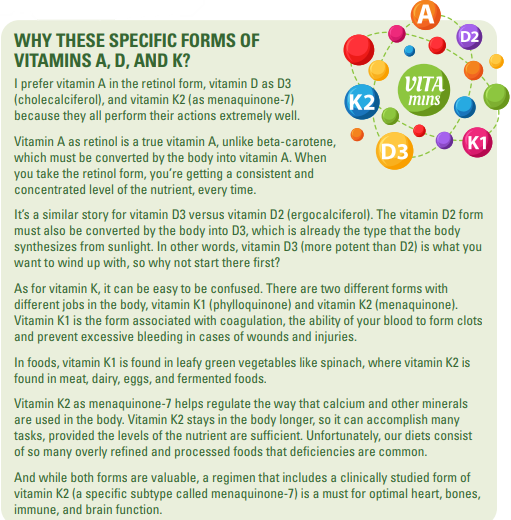Three Nutrients, Many Roles
One of the easiest things to forget when it comes to nutrients and good health is that the basics are incredibly important.
Here, I’ll focus on vitamin A in the retinol form, vitamin D3, and vitamin K2 as menaquinone-7, which I feel is the most superior form of K2. Alone, any one of them is powerful and essential, but the three together are an all-star team for optimal health and well-being.
Strengthens Heart and Cardiovascular System
Vitamins K2, D3, and A support cardiovascular health in a number of ways. One of the most important is their ability to balance calcium levels, which can help protect against certain heart conditions. Calcium plays a key role in blood clotting and muscle contractions of the heart. But as we get older, calcium can also build up in the heart and arteries, making the arteries stiff and inflexible. It also increases the risk of blood clots, strokes, and heart attacks.
Fortunately, research shows that vitamins K2 and D3 can help keep calcium in its proper places and in the right proportions. A Dutch study found that individuals with the highest intake of vitamin K2 (menoquinone-7) had a lower risk of death from coronary heart disease. Other work examining patients with kidney disease, who develop calcium deposits at twice the rate of the general population, found that patients with the lowest intake of vitamin K2 had significantly higher levels of arterial calcification.
Vitamin K2 activates naturally occurring proteins in the body—including matrix GLA-protein (MGP) and osteocalcin—which stop calcium from being deposited in the arteries and instead help it reach bone tissue where it is needed.
Additionally, vitamin K2 reduces levels of an inactive form of MGP (dp-ucMGP) that would otherwise lead to calcium deposits in the arteries. One clinical study found vitamin K2 cut the levels of harmful dp-ucMGP in half and reduced arterial stiffness in menopausal women, an especially at-risk group.
Vitamin D3 is critical for your cardiovascular system, too. It is used by the cells that line your blood vessels and arteries and moderates your blood pressure. A Finnish review found that people with the highest vitamin D levels also enjoyed a 30 percent lower risk of hypertension, and the Framingham Heart Study reported that low blood levels of vitamin D were associated with a 60 percent increased risk of dying from heart failure.
Vitamin D3 works in tandem with vitamin K2, increasing the expression of vitamin K-dependent proteins that prevent arterial stiffening.
Similarly, vitamins A and D appear to work together to regulate calcium. Vitamin A reduces inflammatory markers that put heart disease patients at risk and may slow the hardening of the arteries by boosting T-helper cell activity.
Builds and Preserves Strong Bones
Vitamins A, D3, and K2 are incredibly important to building and maintaining strong bones. Clinical studies have found a positive correlation between vitamin A intake and bone density in women aged 65 to 80 years old. Another clinical study found similar results for both men and women regarding bone mass density in the femoral neck and hip. However, there was one catch: these positive results were only seen in individuals with moderate and high levels of vitamin D.
That’s not surprising since vitamin D is essential for calcium and other mineral absorption into the bones. In fact, one analysis found that daily high dose (defined here as 800 IU) vitamin D supplementation reduced nonvertebral fractures by at least 20 percent in individuals aged 65 and older.
Vitamin K2 is key here as well. It activates osteocalcin, a protein required to bind calcium to the mineral matrix of the bones.
Bolsters Your Immune Defenses
More than ever before, I think people have realized the connection between strong nutrients and a robust immune system.
Vitamin A moderates the activity of key immune system cells—macrophage and natural killer cells—when we are especially vulnerable to bacterial or viral attack. It promotes strong antibody actions, B and T-helper cell activity, and the regeneration of mucosal epithelial cells as a barrier against infection.
Vitamin D3 has a well-deserved reputation as an immune strengthening nutrient. It can help you stay less susceptible to allergies, respiratory ailments, and viral infections. In fact, one review found that each significant increase in vitamin D (10 nmol/l) was associated with a seven percent lower risk of infection.
For a strong respiratory system, vitamin K2 as menaquinone-7 is key. Early clinical research found that treatment with vitamin K2 could help reduce symptoms and severity of bronchial asthma. More recently, researchers believe that vitamin K2 deficiency may be another factor in disease severity or mortality for individuals with COVID-19. That’s because K2 also promotes a key protein, elastin. As the name implies, it helps keep the bronchial system flexible, relaxed, and elastic—making breathing much easier.
Keeps Your Mind Sharp and Mood Positive
Vitamin A is critical for brain activity, mental plasticity, and proper nerve cell signaling to the muscles. Without sufficient levels of the nutrient, you may be more susceptible to memory loss and cognitive decline.
Vitamin D is involved with some of the same concerns, being a primary nutrient for nerve regeneration, signaling, and overall central nervous system activity. Vitamin K2 can protect nerves from inflammatory or oxidative damage.
Low levels of vitamin D have been associated with an increase in depression. Supplementation may help, especially for individuals with serious deficiencies or genetic polymorphisms that prevent efficient, natural vitamin D synthesis from sunlight.
Vitamin D status can also affect sleep patterns, as a review in the journal Nutrients reported. They found that individuals with the lowest levels of vitamin D also experience shorter sleep duration, poor sleep quality, and overall sleepiness during the day.
Additionally, vitamin D3 may be a key to preserving cognitive health as we get older. A clinical study found that individuals 65 and older supplementing with vitamin D for 12 months significantly improved scores in a variety of tests, including full-scale intelligence quotient (a test of complete intelligence), verbal short-term memory, vocabulary, block design (matching color patterns printed on blocks), and picture arrangement scores (creating a rational narrative by rearranging random comic-like panels so they present a proper story).

